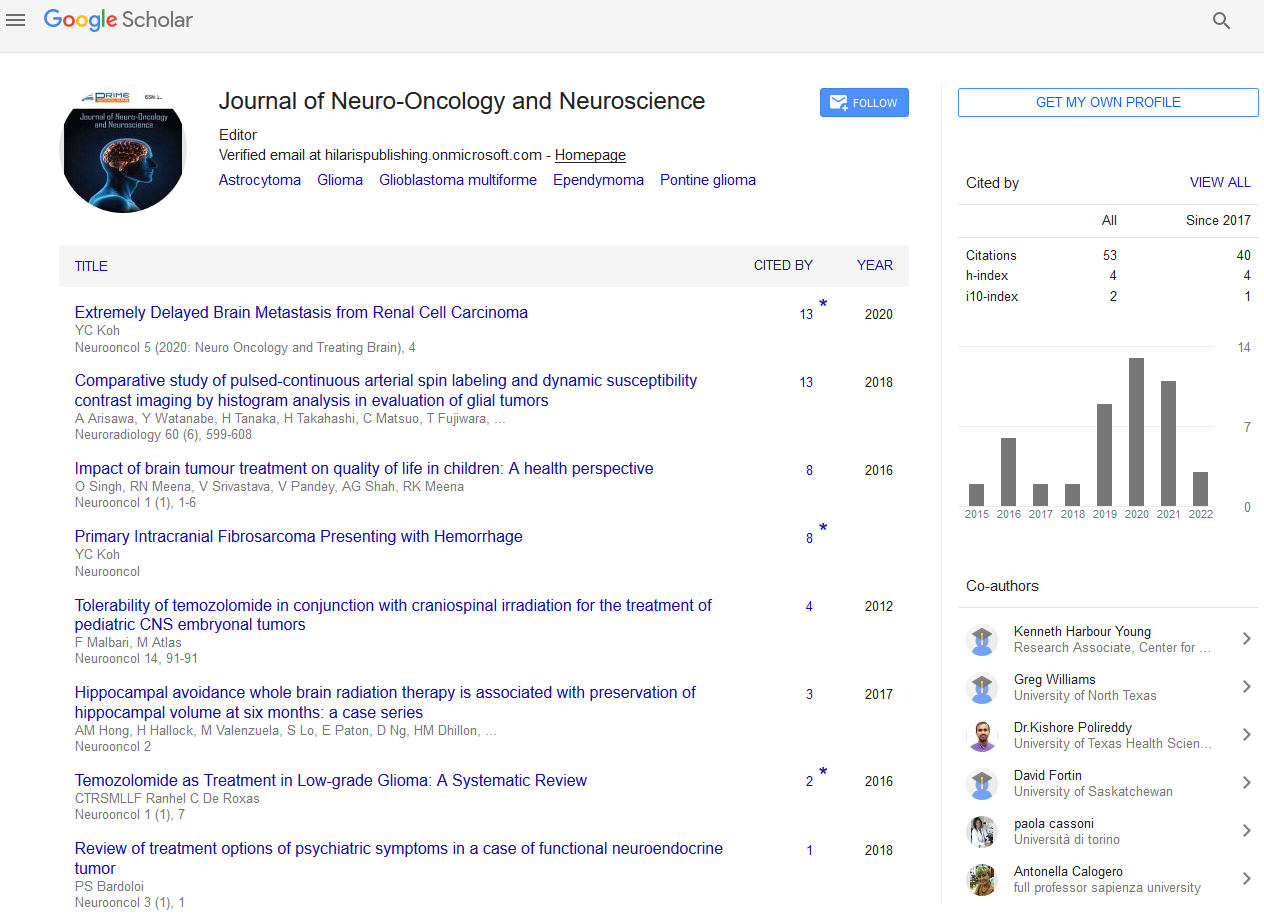Commentry - (2022) Volume 7, Issue 1
A Brief Note on Brain Metastases
Pierre Reginster*
MR division, Philips Benelux, Belgium
*Correspondence:
Pierre Reginster, MR division, Philips Benelux,
Belgium,
Email:
Received: 03-Jan-2022, Manuscript No. IPJNO-22-12624;
Editor assigned: 05-Jan-2022, Pre QC No. IPJNO-22-12624;
Reviewed: 19-Jan-2022, QC No. IPJNO-22-12624;
Revised: 24-Jan-2022, Manuscript No. IPJNO-22-12624;
Published:
31-Jan-2022, DOI: 10.36648/ipjno-7.1.36
Description
Brain Metastases usually occur when the cancer cells spreads
form their site of action to the main area like brain, any cancer
spreads to the brain, but perhaps the most usual types are
lung, breast, colon, kidney, and melanoma. Brain metastases
can result in formation of one or more tumours in the nervous
system. Metastatic brain tumours put pressure on and affect
the function of enclosing brain as they grow. This results in
signs or symptoms like headaches, personality changes, memory
loss, and seizures. Surgery, radiation treatment, chemotherapy,
immunotherapy, or a combination therapy may be
used to treat people for whom the cancer spread to the brain.
In some cases, both these treatments may be suggested. Treatment
is frequently aimed at alleviating cancer-related signs
and discomfort. The signs and symptoms of brain metastases
can differ depending on location, size, and rate of growth of
the metastatic tumours. The following are signs and symptoms
of brain metastases: Headache, occasionally accompanied by
vomiting or nausea, Keeps changing in the mind, including
such increased memory issues, Seizures, On one side of the
body, there’s really weakness or numbness. When cancer cells
spread to the nervous system, they are said to have metastasized.
The cells may scattered (metastasize) through the blood
system or lymph system to the brain, where those who begin to
increase. The primary cancer’s name is given to metastatic cancer
which propagates from its original location. Cancer that has
spread from the breast to the brain, for example, is referred to
as metastatic breast cancer rather than brain cancer. Any form
of tumor can usually spread to the brain, but some cancers are much more likely to trigger brain metastases than others, such
as: Cancer of the lungs, Breast cancer, Cancer of the colon, Cancer
of the kidney, Melanoma. Metastatic brain cancer has no
known cure. Treatment focuses primarily on several objectives:
slowing or lowering brain trauma, extending a person’s life, and
reducing pain. Steroids: Steroids can help decrease swelling in
the brain caused by tumours. This could help Trusted Source
with the other symptoms like headaches and neurological issues.
Even so, this will not remove the cancer. Surgical removal:
Some tumours can be surgically removed. This could increase
a person’s chances of survival and, in the some cases, help
them are becoming cancer-free. Tumors, on the other hand,
can reappear in the future. Whole central nervous system radiation
therapy: This treatment that uses radiation to shrink
the tumour. While it can increase one’s survival chances, it can
also cause brain trauma. Chemotherapy: Chemotherapy is not
really a standard treatment but does not typically enhance
cognitive metastases. Certain chemotherapy or targeted drugs,
on the other hand, are efficient against certain tumours. Chemotherapy
could help the person who has a tumour and have
chance of survival rate to them and live life long. SRS (stereotactic
radiosurgery): The above method employs rays to target
the tumour rather than the entire brain. SRS can be used or
alone conjunction with whole-brain radiotherapy. End-of-life
planning and psychosocial help: Coping with a terminally ill can
indeed be incredibly difficult. Support groups, psychotherapy,
parental support, and assistance in planning a person to die
can make the task experience less overwhelming, empowering
an individual to live their preferred life.
Acknowledgement
None.
Conflict of Interest
We have no conflict of interests to disclose and the manuscript
has been read and approved by all named authors.
Copyright: This is an open access article distributed under the terms of the Creative Commons Attribution License, which permits unrestricted use, distribution, and reproduction in any medium, provided the original work is properly cited.

